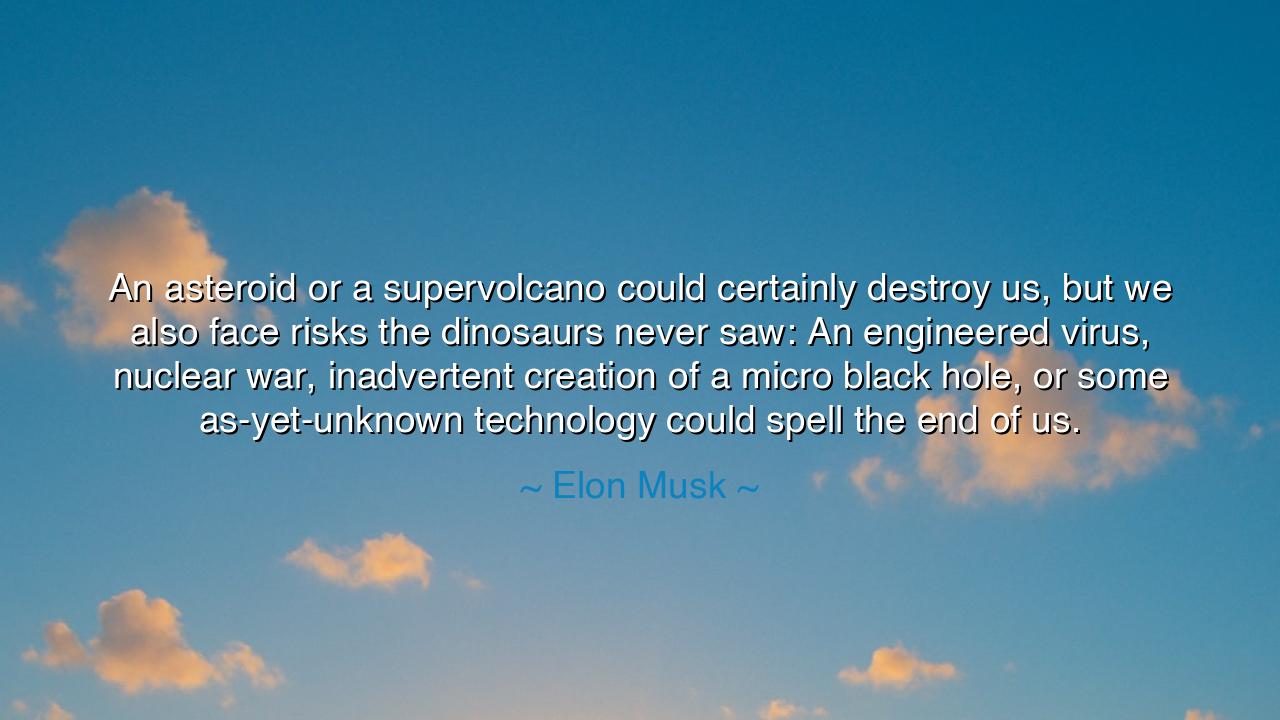
An asteroid or a supervolcano could certainly destroy us, but we
An asteroid or a supervolcano could certainly destroy us, but we also face risks the dinosaurs never saw: An engineered virus, nuclear war, inadvertent creation of a micro black hole, or some as-yet-unknown technology could spell the end of us.






Hear the solemn voice of Elon Musk, who gazed not only at the stars but also into the abyss of mankind’s future, declaring: “An asteroid or a supervolcano could certainly destroy us, but we also face risks the dinosaurs never saw: an engineered virus, nuclear war, inadvertent creation of a micro black hole, or some as-yet-unknown technology could spell the end of us.” These words ring with both dread and clarity, reminding us that the threats of nature, though terrible, are not the only forces that could bring about our undoing. Man himself, through his brilliance and his folly, has become a wielder of powers that may either uplift or annihilate him.
Long ago, it was the asteroid that struck the earth, ending the reign of the dinosaurs and altering the course of life itself. The supervolcano too, in ages past, darkened the skies, cooled the earth, and brought famine to the living. These were natural cataclysms, blind and indifferent, against which no creature could stand. Yet Musk’s warning is that humanity, unlike the beasts of old, has forged new perils with its own hands. We have become not only survivors of fate, but also creators of it.
Consider the shadow of nuclear war. In the twentieth century, humanity unleashed the fire of the atom. What was first born in secret laboratories as a quest for knowledge became the firestorm that consumed Hiroshima and Nagasaki. For the first time, man realized he held in his grasp the power to end not just armies, but civilization itself. Unlike the asteroid, this peril does not come from the heavens, but from human pride, fear, and anger. It is a weapon waiting not in the cosmos, but in our own cities and stockpiles, a danger woven into the fabric of our politics and conflicts.
And ponder the subtlety of the engineered virus, which Musk names as another peril. Once, pestilence was the cruel hand of nature, striking blindly, as in the Black Death that swept Europe and silenced a third of its people. Yet now mankind has the power to shape life itself, to twist the very code of existence. Such power could heal, yes, curing diseases and extending life. But wielded with malice or recklessness, it could become a scourge greater than any plague of old—swift, targeted, unstoppable. Unlike the volcano or the asteroid, this danger is not distant or rare; it could be born in a hidden laboratory, fashioned by human hands.
The micro black hole Musk mentions is a symbol of yet another danger: the unknown. For as humanity presses forward into realms of science unseen, it toys with forces it scarcely understands. Just as the alchemists of old sought gold but risked poison, so too modern seekers may unleash powers they cannot control. Whether in the halls of particle accelerators or the birth of artificial minds, humanity stands ever at the threshold of discovery, where the line between wonder and ruin is thin.
The lesson is clear: we live in an age where the greatest dangers are not only natural but also technological, born from our own ingenuity. Unlike the dinosaurs, who could do nothing against the falling fire, we are both the threatened and the threat. Our salvation, then, lies not in ignorance, but in vigilance; not in halting progress, but in guiding it with wisdom, restraint, and foresight. We must remember always that knowledge without conscience is peril, and power without prudence is doom.
Therefore, my child, what must you do? Guard your works with humility. Seek progress, but never without considering its shadow. When you build, ask: does this creation serve life, or does it endanger it? When you wield knowledge, temper it with compassion. When you confront the future, do not be lulled by marvels alone, but remain awake to the risks that accompany them. Strive not merely to invent, but to preserve, to protect, to endure.
Let Musk’s words endure as a beacon: The dangers of nature may one day return, but the greater peril is the recklessness of man with his own creations. Be therefore a steward of wisdom in the age of power. For if we master ourselves, we may survive even the asteroid and the volcano. But if we fail, we shall perish not by fate, but by our own hand.






AAdministratorAdministrator
Welcome, honored guests. Please leave a comment, we will respond soon